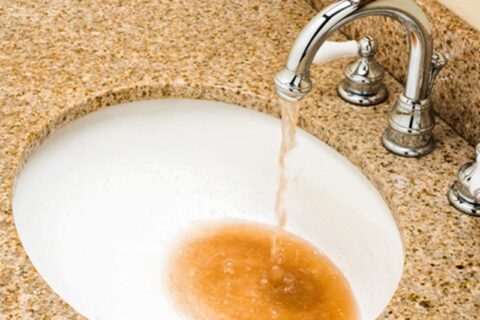Introduction
Rusty brown water from your sink can be alarming, and it often raises concerns about water quality and safety. Typically, this issue comes with a metallic taste and a brownish tint, pointing to several possible causes. For instance, it could stem from old plumbing, an aging water heater, or sediment buildup. Additionally, municipal water supply problems or rust in household appliances may play a role. To effectively address the problem, it’s important to identify its root cause. In this article, we’ll explore each potential cause in detail and provide practical solutions to help restore your water’s quality.
Corroded Pipes
- The Problem – Pipes made of iron or steel are particularly susceptible to rust. As water flows through these pipes over time, the inner surfaces undergo a natural oxidation process, leading to corrosion. This corrosion is not just a surface-level issue, but can penetrate deep into the metal. And if left unchecked, can weaken the structural integrity of the pipes.
- Impact on Water Quality – Rust particles from corroded pipes mix with the flowing water, leading to a noticeable change in color. This not only impacts the aesthetic appeal of the water but can also alter its taste and potentially its safety.
- Long-Term Implications – Continuous corrosion without intervention can lead to leaks and significant plumbing issues, requiring more extensive and costly repairs.
Rusty Water Heater
- Internal Conditions – Water heaters are constantly exposed to water and heat, an environment that can accelerate the rusting process, especially in units with a compromised anode rod, which is designed to prevent rust.
- Effect on Hot Water – The presence of rust in your water heaters is particularly noticeable when using hot water, as the heating process can dislodge rust particles, which then flow out of the tap. This means that the discoloration is often more pronounced when using hot water as opposed to cold.
- Preventive Measures – Regular maintenance, including checking and replacing the anode rod and flushing the tank to remove sediment, can extend the life of your water heater and prevent rust formation.
Sediment Buildup
- Source of Sediments – Over time, minerals like iron and manganese, present in the water, settle at the bottom of pipes and water heaters. These sediments can accumulate, forming a layer that can harbor bacteria and rust.
- Triggering Factors – Changes in water pressure or flow can disturb these sediments, causing them to mix with the water and create a rusty appearance.
- Solutions – Regular flushing of the water heater and occasional cleaning of pipes can help in removing these sediments and preventing discoloration.
Municipal Water Supply Issues
- External Factors – Sometimes, the cause of brown water lies outside your home, in the municipal water supply. This can happen due to changes in the source water, maintenance work, or infrastructure breakdowns like burst water mains.
- Community-Wide Impact – Such issues usually affect an entire neighborhood or community. It’s often accompanied by official advisories or notices from the water authority.
- Response Strategies – In such cases, it’s important to stay informed through local news or direct communications with the water authority. Boiling water or using water filters can be temporary measures until the issue is resolved.
Internal Rust in Aging Appliances
- Appliances as a Source – Rust can develop in older appliances such as washing machines and dishwashers, whose metal parts can be exposed to water.
- Intermittent Occurrences – This rusting can intermittently release rust particles into the water, which becomes evident when the appliance is used.
- Maintenance and Inspection – Regular inspections and maintenance of these appliances can help in identifying and addressing rust before it impacts water quality.
Conclusion
Rusty brown water from the sink is a multifaceted issue that can stem from various sources within and without the home. It not only poses aesthetic and taste concerns, but also signals potential health risks and plumbing system degradation. By understanding the different causes, homeowners can take the proper steps toward resolution. Regular maintenance, timely upgrades, and proactive communication with municipal authorities all play a pivotal role in ensuring the delivery of clean, clear, and safe water in your home. Ultimately, addressing rusty water issues not only aides in restoring water quality, but also held to maintain the overall health of your home’s plumbing system.
Your Go-To Plumbing Services in north DFW
Specialty Plumbing is a family-owned and operated company proudly serving North DFW, including Celina, Frisco, McKinney, Plano, Allen, and Prosper, and surrounding areas. Our team is committed to providing exceptional customer service because we understand that plumbing issues can arise unexpectedly. Our mission is to resolve them swiftly and efficiently! Reach out to us today, for any plumbing service you need, and witness our commitment to excellence firsthand!
At Specialty Plumbing we love to empower our clients with general knowledge of their plumbing systems! If you have any questions on a topic, please feel free to reach out. We’re here to continue creating content that educates you further on your plumbing system.
